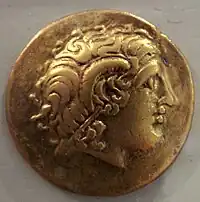

Divico was a Celtic king and the leader of the Helvetian tribe of the Tigurini.[1] During the Cimbrian War, in which the Cimbri and Teutons invaded the Roman Republic, he led the Tigurini across the Rhine to invade Gaul in 109 BC. He defeated a Roman army near present-day Agen on the Garonne river at the Battle of Burdigala in 107 BC, killing its leaders Lucius Cassius Longinus, the Roman consul, and Lucius Calpurnius Piso Caesoninus.[1] Eventually he led his people back to the tribes of the Helvetii, near present-day Switzerland where they settled in the Jura Mountains near Lac Leman. 49 years later, before the Battle of Bibracte, he led a delegation back to Gaul to negotiate for a safe passage for his tribe through the Roman region of Provence. The request was denied by Caesar who wanted revenge for a relative who had been killed in the battle near Agen in 107 BC.[1]
He is not to be confused with the military and religious leader of another gaulish tribe, Diviciacus of the Aedui.
See also
Notes
- 1 2 3 Mountain, Harry (1998). The Celtic Encyclopedia. p. 553. ISBN 978-1-58112-892-5.
